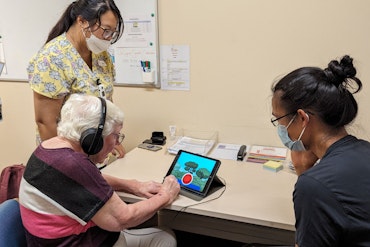Senior patients were more likely to be prescribed older medicines following stroke
Do we need new guidelines to provide newer-generation drugs for seniors?
![<p>The findings have been published in Epilepsia Open and were presented at the International Conference on Pharmacoepidemiology & Therapeutic Risk Management in Halifax Canada. [Source: Shutterstock]</p>](https://agedcareguide-assets.imgix.net/news/articles/wp/strokeantiseiz___1209.jpg?fm=pjpg&format=auto&w=550&q=65)
The findings have been published in Epilepsia Open and were presented at the International Conference on Pharmacoepidemiology & Therapeutic Risk Management in Halifax Canada. [Source: Shutterstock]
Key points:
- Patients aged 85 years and older were among those who were prescribed older antiseizure medications following ischaemic stroke
- The Monash University study also found that other vulnerable patient groups, such as those with dementia and psychiatric conditions were more likely to receive the older medication
- People who were 60 years or older were considered more likely to develop epilepsy following a stroke
Researchers from the Centre for Medicine Use and Safety at the Monash Institute of Pharmaceutical Sciences followed 19,601 people hospitalised with a first ischaemic stroke in Victoria from 2013 – 2017. From the sample size of people in the study, 989 were dispensed antiseizure medication within 12 months of hospital discharge.
Whilst there was an overall trend toward the dispensing of newer antiseizure medications over time, it was the most vulnerable groups being prescribed older medications, increasing their risk of being exposed to adverse events and polypharmaceutical interactions.
Compared to the general population, people who experience a stroke are at higher risk of developing epilepsy, which is a common and serious neurological disorder characterised by recurrent unprovoked seizures.
CMUS PhD candidate Stella Kim said those aged 60 years and older run a higher risk of developing newly diagnosed epilepsy after stroke and therefore optimal medication treatment plans are crucial.
“Antiseizure medications are the main treatment option for controlling seizures after stroke and treatment should be individualised according to factors such as seizure type, demographic factors, comorbidities and concurrent medications,” said Ms Kim.
“Our study highlights the need for further research into the comparative safety and effectiveness of antiseizure medications.”
The European Stroke Organisation’s Guidelines for the Management of Post-Stroke Seizures and Epilepsy recommended commencing antiseizure medication treatment after one unprovoked seizure. However, prescribing patterns of ASMs in people with post-stroke epilepsy differ across countries and over time.
Early studies in Taiwan and Sweden reported that carbamazepine and phenytoin were the most prevalent ASMs dispensed, while levetiracetam was most prevalent in more recent studies from Sweden, Italy and Japan.
A previous Australian study between 2002 and 2007 reported that valproate was the most frequently dispensed ASM regardless of the indication followed by carbamazepine and phenytoin.
Since there were no Australian clinical practice guidelines on post-stroke seizures, physicians may prefer to choose ASMs with a long history of established safety profiles, despite the increasing global prevalence of newer-generation ASMs.
Senior author Dr Jenni Ilomaki said “older antiseizure medications are often associated with side effects and interactions and it’s concerning these medications were dispensed to vulnerable patient groups arguably at greatest risk of medication-related harm.”
“Our hope is the findings from this study will pave the way for further investigation into the effectiveness and safety of different antiseizure medications in Australia’s most vulnerable groups.”
To read the full Monash University study, please visit the report online. Do you believe that greater post-stroke guidelines are needed in Australia? What sort of medication would you prefer? The tried and tested or the newer-generation treatment? Let the team at Talking Aged Care know!























